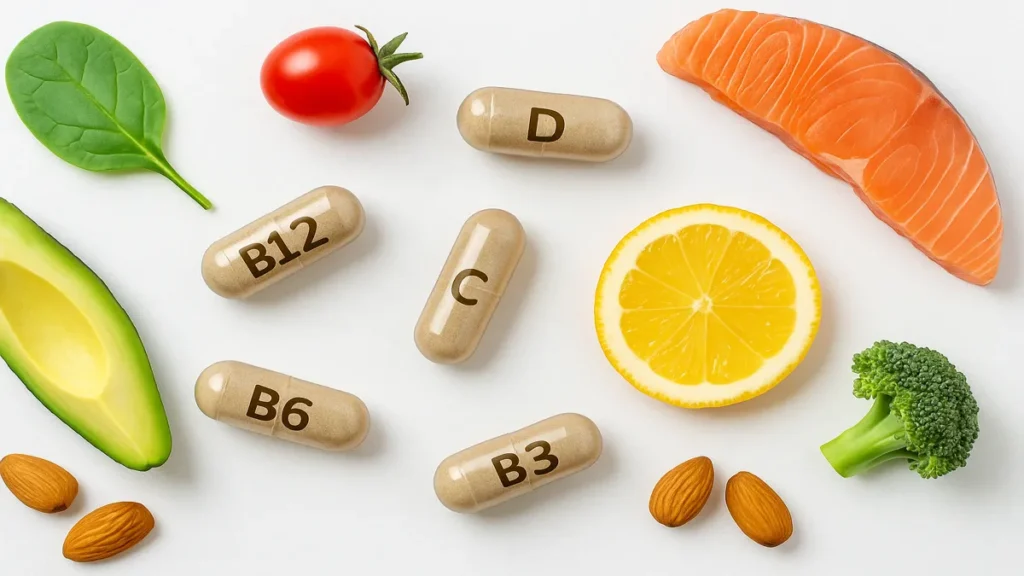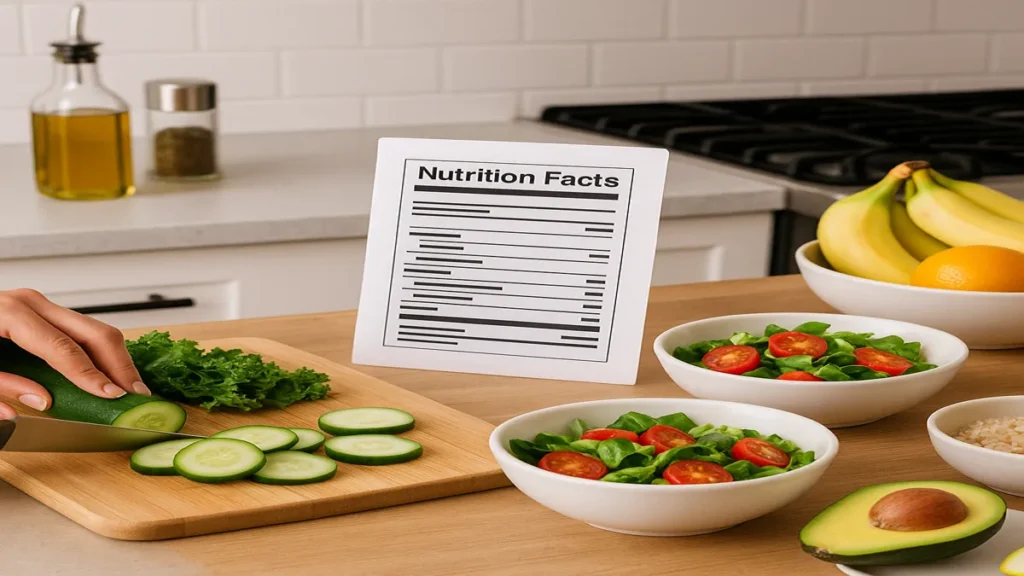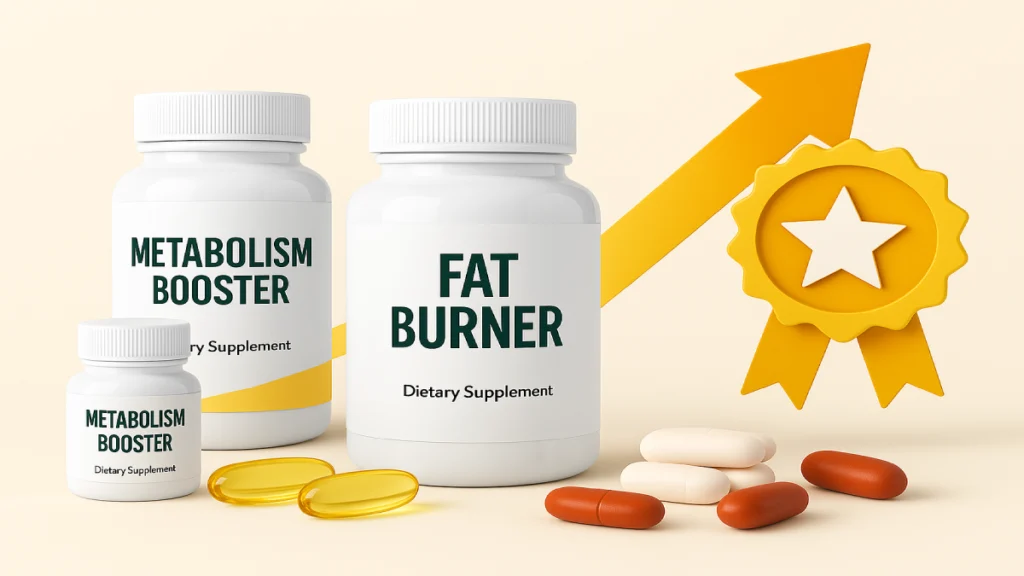
What vitamins boost metabolism is a common question today. Many people feel tired or stuck, even with healthy habits. They eat clean, stay active, and still struggle with weight or low energy. Often, the issue isn’t effort — it’s what’s missing inside the body.
Vitamins play a vital role in how your cells create and use energy. They help convert food into fuel, burn fat, and support hormone balance. Yet, their impact on metabolism is often overlooked. Without the right vitamins, your system slows down. Energy drops, fat builds up, and cravings get stronger.
Fortunately, there are solutions. By understanding which vitamins matter most and how to get them, you can take control of your metabolism again. Some nutrients come from food. Others may require supplementation for real results.
In this article, you’ll discover the best vitamins for metabolic health, how they work inside the body, and when to consider adding them to your daily routine.
👉 Want to give your metabolism a real boost? Check out the top-rated supplements here.
Why Vitamins Matter for Metabolism

Metabolism is the process your body uses to turn food into energy. It powers everything from thinking clearly to breathing and moving. However, it doesn’t just happen on its own. Instead, it relies on a series of precise chemical reactions inside your cells.
To perform these reactions efficiently, your body needs essential tools. That’s where vitamins come in. They’re not optional add-ons. On the contrary, they’re required at every step. Without them, your metabolism can slow down. As a result, you may feel tired, gain weight more easily, or struggle with mood swings.
In fact, vitamins act like keys in a motor. Just as a car needs the right key to start, your body needs specific vitamins to unlock energy from food. For example, B vitamins help convert carbohydrates and fats into usable energy. Vitamin D regulates hormones like insulin and supports your thyroid. Meanwhile, vitamin C helps control stress-related hormones, which also impact fat storage.
Moreover, deep inside your cells, especially in the mitochondria, vitamins help enzymes do their job. These enzymes create ATP, which is your body’s main energy source. Without enough vitamins, that energy process becomes inefficient, even if you eat a healthy diet.
That’s why supporting your metabolism goes beyond calories. It’s not only about how much you eat, but how well your body can use what you eat. With the right vitamins in place, your metabolism runs smoother, your energy increases, and your health improves naturally over time.
The Best Vitamins to Boost Metabolism

To boost your metabolism, some vitamins play a direct role. Others work behind the scenes but are just as important. In every case, these nutrients unlock vital steps in how your body produces and uses energy. Let’s break down the best ones to focus on.
Vitamin B12 – Energy production and fat oxidation
Vitamin B12 helps convert food into energy. More specifically, it supports fat metabolism and red blood cell production. Without it, your body may slow down. In fact, fatigue and brain fog are common signs of low B12 levels.
This is especially true if you follow a vegan or vegetarian diet. Because B12 comes mostly from animal sources, many people are deficient. You’ll find it in eggs, dairy, fish, meat, and fortified foods. As a result, supplementation is often helpful.
Thanks to its role in nerve function and oxygen transport, B12 keeps your energy steady and metabolism active.
Vitamin B6 – Hormone and protein metabolism
B6 supports several hormonal functions. For example, it helps regulate serotonin and thyroid hormones. It also breaks down proteins, making it crucial for muscle repair and steady energy. When B6 is low, you might notice poor mood, low focus, or physical fatigue.
In terms of food, it’s found in poultry, tuna, bananas, and chickpeas. Even so, many people don’t get enough. Because it helps balance stress and supports thyroid health, B6 keeps your metabolism from crashing during busy days.
Vitamin D – Insulin regulation and thyroid function
Vitamin D is best known for bone health, but it does much more. It directly affects how your cells respond to insulin. That matters because insulin controls fat storage. If insulin sensitivity is low, fat burning becomes harder.
Low vitamin D is very common, especially during winter or in people with darker skin. You can get it from sun exposure, fatty fish, and fortified foods. Sometimes, supplements are necessary to reach optimal levels. Moreover, vitamin D supports your thyroid the gland that sets your metabolic rate.
Vitamin C – Cortisol control and fat metabolism
Vitamin C helps manage stress by reducing cortisol levels. High cortisol often leads to belly fat and low energy. In addition, it plays a role in immune support and fat transport. Without enough vitamin C, you may feel tired, inflamed, or prone to illness.
You’ll find it in citrus fruits, bell peppers, berries, and broccoli. However, stress and illness quickly deplete your stores. Because it supports carnitine production, vitamin C indirectly boosts fat burning and physical recovery.
Vitamin B1 (Thiamine) – Carbohydrate breakdown
Vitamin B1 is essential for breaking down carbohydrates. It helps your body turn glucose into real energy. When thiamine is lacking, your body struggles to process carbs efficiently. As a result, you feel heavy and sluggish. Common signs of deficiency include fatigue, brain fog, and poor coordination.
Thiamine is found in whole grains, seeds, and legumes. Yet many processed foods lack this key nutrient. Thanks to its role in energy conversion, B1 keeps your metabolism responsive and efficient especially after meals.
Niacin (Vitamin B3) – Supports mitochondria and ATP
Vitamin B3 powers your mitochondria, the engines inside your cells. These produce ATP, your body’s energy molecule. Without enough niacin, ATP production drops. That means less energy for your brain, muscles, and metabolism.
You may feel weak or unfocused when niacin is low. In some cases, your skin may show signs too. Niacin is found in turkey, tuna, peanuts, and whole grains. However, intense training or stress can increase your need for it. Because it helps maintain cholesterol and energy levels, B3 supports a faster, more stable metabolism.
Recap Table: Key Vitamins for Metabolism
| Vitamin | Main Role | Food Sources | Metabolic Effect |
|---|---|---|---|
| B12 | Fat oxidation, energy | Meat, fish, eggs, cereals | Boosts fat burning and stamina |
| B6 | Hormone regulation | Poultry, bananas, chickpeas | Balances metabolism and mood |
| D | Insulin, thyroid support | Sunlight, salmon, eggs | Increases energy usage and fat control |
| C | Cortisol control | Citrus, peppers, strawberries | Reduces stress-related fat storage |
| B1 | Carb metabolism | Whole grains, legumes | Converts glucose into usable energy |
| B3 | ATP & mitochondrial support | Tuna, peanuts, turkey | Improves cellular energy and performance |
What About Minerals and Cofactors

Vitamins do a lot for your metabolism, but they rarely work alone. In fact, many of them need minerals and cofactors to activate properly. Without those helpers, even the best vitamin can lose its effect.
Take magnesium, for example. It helps convert vitamin D into its active form. Without enough magnesium, your body can’t use vitamin D effectively. As a result, your metabolism may slow down even if your diet looks good on paper. Similarly, zinc supports the production of thyroid hormones, which directly control your metabolic rate.
Let’s not forget iron. It helps carry oxygen to your cells, allowing mitochondria to produce energy. When iron is low, you may feel tired, weak, or unfocused. Meanwhile, chromium helps regulate blood sugar by supporting insulin function. This also affects fat storage and energy use.
Because of these interactions, relying on vitamins alone may not be enough. That’s why well formulated multivitamin supplements often work better. They combine vitamins with essential minerals for full metabolic support.
Together, vitamins and minerals create synergy. One boosts the other. That’s how you get real, lasting energy and a metabolism that stays active.
Can You Get Enough From Diet Alone?

In theory, a balanced diet should cover your needs. But in practice, that’s rarely the case. Modern food often lacks the nutrients your body depends on. Even when meals seem healthy, the quality of ingredients has changed. Soil depletion, long storage, and heavy processing reduce vitamin content dramatically.
As a result, many people even those who eat well still develop deficiencies. Low levels of magnesium, vitamin D, or B vitamins are common. These shortages affect energy, mood, and even fat burning. Athletes and active people aren’t immune. In fact, they often need more nutrients to recover and perform.
Stress makes the problem worse. It speeds up nutrient loss. So does dieting, poor sleep, or intense exercise. When your body is under pressure, it needs more support. However, food alone may not provide enough.
That’s where smart supplementation helps. It fills the gaps your plate can’t cover. It also supports your metabolism when life gets hectic. While supplements should never replace real food, they can prevent the fatigue, cravings, and slowdowns that come from missing nutrients.
In short, for many people, food alone just isn’t enough. The right supplements can make all the difference, especially during times of stress or change.
How to Choose the Right Metabolism Boosting Supplement

Not all supplements are created equal. Many cheap products look promising but deliver little. They often use poor quality ingredients or low doses. Others rely on flashy labels but skip what really matters.
To avoid disappointment, stay away from generic formulas filled with synthetic additives or “proprietary blends.” These mixes hide actual dosages and make results hard to track. Instead, look for transparency and precision.
Focus on formulas that include vitamins B1, B6, B12, C, and D, plus essential minerals like magnesium and zinc. These nutrients work together to fuel your cells, support fat burning, and regulate hormones.
Just as important is bioavailability. This means your body can absorb and use what you take. For example, methylated B vitamins absorb better than standard ones. Liposomal vitamin C is gentler and more effective than tablets. When supplements use active forms, your body works less to convert them and sees results faster.
Also consider how the product fits into your routine. Capsules may be easier than powders. Doses should be clear and based on real science, not marketing hype.
A great supplement supports your system without side effects or confusion. When done right, it fills the gaps your food can’t cover and helps your metabolism thrive.
👉 Looking for a tested, complete blend? Explore our favorite metabolism boosters.
Conclusion – Fuel Your Metabolism from Within

Your metabolism needs the right tools to work well. Vitamins are part of that foundation. However, not just any supplement will do. The form, the dose, and the mix all matter.
Food should come first, but today’s diets don’t always deliver enough. That’s why smart supplementation makes sense, especially under stress, during weight loss, or intense training.
By combining real food with targeted vitamins and cofactors, you give your metabolism the support it deserves. This leads to better energy, smoother fat burning, and greater balance over time.
👉 Your body deserves better fuel. Start here and discover our top-rated metabolic support supplements.
FAQ – Vitamins & Metabolism
Yes, certain vitamins help your body produce energy and burn fat more efficiently.
They’re a great start, but full support often needs vitamins C, D, and key minerals too.
Most people notice changes within 1–3 weeks, depending on diet, stress, and dosage.
Yes, but combining them with movement improves results. Even walking helps.
Morning is best for energy-focused vitamins. Fat-soluble ones like D can be taken later.



















